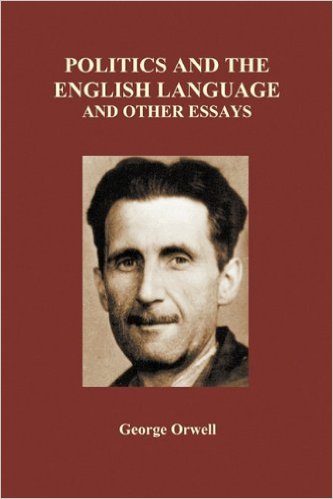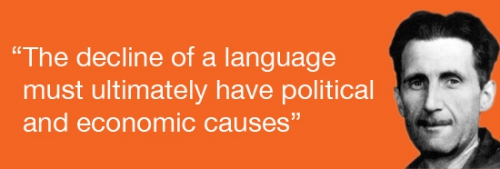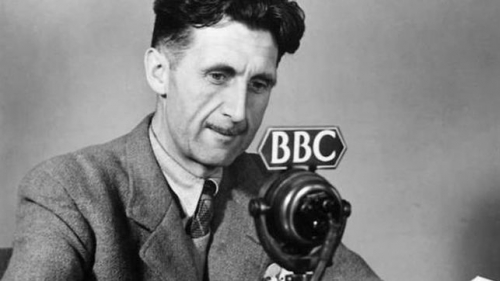 George Orwell’s classic essay “Politics and the English Language [2]” ostensibly teaches us how to write well. More importantly, however, it teaches us how to think well before we write. According to Orwell, slovenly thought leads to slovenly writing as much as slovenly writing leads back to slovenly thought. In this essay, Orwell derides the politics of his day as being imbued with conformity of expression and the distancing of this expression from Truth. Nothing can achieve this more effectively than slovenly writing.
George Orwell’s classic essay “Politics and the English Language [2]” ostensibly teaches us how to write well. More importantly, however, it teaches us how to think well before we write. According to Orwell, slovenly thought leads to slovenly writing as much as slovenly writing leads back to slovenly thought. In this essay, Orwell derides the politics of his day as being imbued with conformity of expression and the distancing of this expression from Truth. Nothing can achieve this more effectively than slovenly writing.
The essay, which is fairly short, can be found here [2]. One does not need to be a writer to appreciate it just as one does not need to be an athlete to appreciate a book on exercise. Clear and disciplined writing, according to Orwell, is the noontime sun to the night of obfuscation and equivocation. Imagine politics without these two things. It wouldn’t be hard to do if everyone abided by the lessons in “Politics and the English Language.”
I cannot surpass Orwell in this regard, but I will attempt to augment him. But first, a brief summation. Bad writing, according to Orwell, includes “staleness of imagery” and “lack of precision.” In the former case, writers won’t select words to convey meaning so much as string together ready-made phrases written by others. These phrases will invariably contain overused metaphors, unnecessary words, and pretentious diction. In the latter case, writers will eschew concrete detail and the active voice in order to make unpleasant realities appear less unpleasant. The result is both vague and dishonest.
To avoid bad writing, writers should follow these six rules:
- “Never use a metaphor, simile, or other figure of speech which you are used to seeing in print.”
- “Never use a long word where a short one will do.”
- “If it is possible to cut a word out, always cut it out.”
- “Never use the passive when you can use the active.”
- “Never use a foreign phrase, a scientific word or a jargon word if you can think of an everyday English equivalent.”
- “Break any of these rules sooner than say anything outright barbarous.”
I left much out of this synopsis, hoping that you will experience Orwell before getting around to me. Indeed, I try to read “Politics and the English Language” once every few months or so, just to keep it fresh in my mind.
My first addendum echoes Orwell’s disdain for pretentious and complicated diction. Here, euphemisms deflect attention away from horrific details, making them seem acceptable to the public. Orwell provides several examples, including the brutal dekulakization of the early Soviet period which claimed the lives of millions of Ukrainians. This atrocity is now blandly referred to as the “transfer of population.” This was a very real thing back then. In 1933, the pro-Soviet New York Times published the following about the Soviet-mandated famine:
The food shortage is the result of a nation-wide peasant strike precipitated by the rough-shod methods of the Soviet government in hacking through to its industrialization objectives.
In order to soften the subject matter, the Times re-branded deadly famines as mere “food shortages” and mass executions and deportations as ill-defined “rough-shod methods.” Note the stale imagery and lack of precision. Note also how the passive tense and the backwards composition of the passage seems almost to exonerate the killers. In the passage, the Times orders the events like so:
Food Shortage → Peasant Strike → Rough-shod Methods
But chronologically, what happened was:
Rough-shod Methods → Peasant Strike → Food Shortage
Truly “rough-shod methods” (whatever they may be) are to blame. But in order for a reader to figure that out, he would have to work through what was already an insipid and convoluted passage, and then reassemble it in the exact opposite way in which it originally appeared. This requires too much work for most readers, and so something that should appall will simply be skimmed and forgotten. Orwell dwells not just on the laziness of writing but also its dishonesty. The writer most likely had sympathy for the Soviet Union, and so obscured his criticism in abstruse language to deaden whatever reaction people might have upon reading it.
What Orwell doesn’t mention however is what I call the Intimidation Factor. When presented with a tangled web of language like the one above, which contains a five-syllable word (“precipitated”) and a seven-syllable word (“industrialization”), most readers in the general population will discover they lack the brainpower to parse such a sentence in real time. Such a sentence is intimidating. And since most readers will be loath to admit this, they will instead pretend to understand it, thus allowing any deceptions therein to go unchallenged. Even worse, such a reader may pass on the same poorly-constructed language to others so he, in turn, can have the pleasure of intimidating people. Rather than admit they didn’t follow such grotesque turns of phrase, his audience will simply nod along as if they agree with every word. And so the cycle of slovenly thought continues.
My second addendum involves a more immediate effect of badly-formed language: a waste of the reader’s time. Presumably, most readers value their time and read only during the moments when they are between things to do. I always imagine people reading me during their eight-minute subway ride to work. The last thing I want is for them to run out of time and then forget me. Avoiding the mistakes Orwell describes helps ensure that your ideas not only reach the reader but stay with him.
Malcolm Gladwell, in chapter two of his famous book Outliers, provides an excellent example:
For almost a generation, psychologists around the world have been engaged in a spirited debate over a question that most of us would consider to have been settled years ago. The question is this: is there such a thing as innate talent?
Gladwell’s wordiness seemingly attempts to build suspense before revealing the psychologists’ question. In this, Gladwell resembles a magician stalling for time before revealing the two of clubs up his sleeve. While children may appreciate such games, most adult readers, whose time is valuable, won’t. Gladwell used 42 words to express a rather pithy idea. Here it is, pared down to 18:
For almost a generation, psychologists have been debating something most people take for granted: whether innate talent exists.
I concede that this example, while direct, may lack the style or finesse to be fun to read. However, from this nucleus Gladwell could have added ten words of pure flourish and still have kept well below the published word count. He could have also have used these ten words to introduce new ideas or embellish existing ones. Such excess may seem innocuous at first. When spread out across an entire volume, however, we realize that it isn’t. 18 plus 10 is 28. 28 is two-thirds of 42. This means that a book of 100,000 words written in this manner will contain between 33,000 and 34,000 wasted words. This will only exasperate the reader and lessen the writer’s likelihood of propagating his ideas.

My last addendum will be my briefest: Always assume a skeptical attitude on the part of the reader. Orwell touches on this idea, and I wish he had delved a bit deeper. All writers should assume reader skepticism because this will unleash in him the most powerful emotion: fear. Fear of being attacked and rebutted by unsympathetic readers is a marvelous motivation to root out the errors mentioned in Orwell’s rules above. Without fear, a writer can get complacent and lazy, which leads almost inevitably to slovenly language. When you assume that all readers are unsympathetic, however, self-editing becomes second nature, and, in my opinion, your writing greatly improves.
Of course, we on the Alt Right know this fear well. We know the hostility we face and we know the dire consequence of what we write. We’re trying to drastically change our world, and our enemies are not only formidable but everywhere. Perhaps this is one reason why I am drawn to the writing on the Alt Right. For the most part it is revolutionary yet measured, direct, and well-thought out. You will often get this from people beyond the edges of the Overton Window. They want in, but are not willing to sacrifice their integrity to get in. So, instead of crashing the window, they aim to pull it closer to where they already stand. The best way to do this is to communicate clearly and honestly in language which is concrete, active and original — all of which is prescribed in Orwell’s “Politics and the English Language.”





 del.icio.us
del.icio.us
 Digg
Digg
Les commentaires sont fermés.